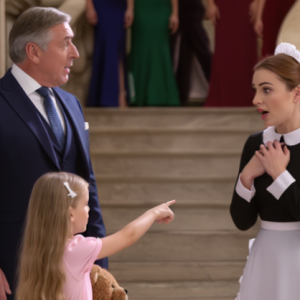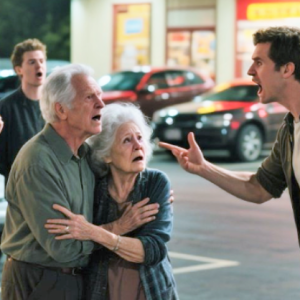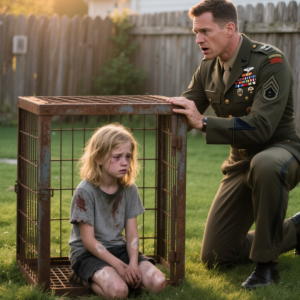The piercing wail cut through the recycled air of first class like a siren, drowning out the gentle hum of the Boeing 787’s engines. Harrison Reed, CEO of Reed Enterprises and self-made billionaire, felt every pair of eyes on the plane boring into the back of his Italian silk suit as his six-month-old daughter Olivia’s face contorted into an impossible shade of crimson. Three hours into the transatlantic flight, and the baby hadn’t stopped screaming since takeoff.

The flight attendant’s practiced smile had long since cracked, revealing thinly veiled contempt as she approached, her voice barely audible over the infant’s shrieks. “Sir, we’ve had several complaints. Is there anything else we might try to quiet her down?”
Harrison wiped sweat from his brow with a monogrammed handkerchief, desperation etched into lines around his eyes. His wife, Catherine, was in Paris on business, and he’d foolishly thought he could handle their daughter alone on the flight to meet her. Now, as passenger after passenger shot daggers his way, he realized how catastrophically wrong he’d been.
“I’ve tried everything,” he whispered hoarsely, bouncing Olivia. “Bottles, toys, walking…” His voice cracked with exhaustion.
Nearby, an elderly woman tutted loudly, muttering something about people who can’t control their children. A businessman in a neighboring seat slammed his laptop shut, jamming noise-cancelling headphones over his ears.
From the economy section, seventeen-year-old Marcus Johnson heard the commotion. The heavy curtain separating first class from the rest of the plane couldn’t muffle the baby’s distress. He shifted uncomfortably in his cramped seat, the threadbare hoodie he’d had since freshman year pulled up over his head. In twelve hours, he would be landing in London for the International Chess Championship, his one shot at a college scholarship. He needed rest before the biggest competition of his life.
But as the baby’s cries escalated and the atmosphere on the plane grew increasingly hostile, something tugged at Marcus’ conscience—the memory of his little sister Zoey, now seven, and how only he could calm her when she was colicky as an infant. His mother had called it the magic touch.
Before he could second guess himself, Marcus unbuckled his seat belt and stood up, his lanky frame unfolding in the cramped aisle. The flight attendant moving through economy with the beverage cart gave him a sharp look. “Sir, please remain seated. We’re experiencing light turbulence.”
“That baby’s been crying for hours,” Marcus said, his voice quiet but firm. “I think I might be able to help.”
The flight attendant’s eyes narrowed with suspicion. “First class is off limits unless you’re a ticketed passenger for that section.”
Marcus felt the familiar weight of prejudgment settle on his shoulders as she took in his worn jeans, his public school hoodie, the color of his skin. He’d encountered this look countless times before—in stores where security followed him, in classrooms where teachers expressed surprise at his advanced placement status, in chess tournaments where opponents underestimated him until checkmate.
“I understand,” he said, his voice steady despite the blood rushing in his ears. “But sometimes the solution comes from unexpected places.”
Before the flight attendant could respond, the curtain to first class was yanked back, revealing a frazzled Harrison Reed, holding his screaming daughter awkwardly against his shoulder. The businessman’s normally immaculate appearance was in shambles, his bespoke shirt wrinkled and stained, his eyes bloodshot from exhaustion.
“Please,” he said, his voice breaking as he addressed no one in particular. “I’ll pay anyone who can get my daughter to stop crying.”
The moment stretched like taffy, passengers averting their eyes from the powerful man’s vulnerability, except for Marcus, who stepped forward, hands slightly raised.
“Sir,” he said quietly, “I might be able to help your daughter.”
For a brief moment, something ugly flickered across Harrison’s face—doubt, maybe suspicion, as he took in the young Black man in economy clothing approaching him. But desperation quickly overrode everything else. Three hours of nonstop screaming had brought the billionaire to his knees.
“You have experience with babies?” Harrison asked, trying to keep the skepticism from his voice.
“My little sister had colic,” Marcus replied, his calm confidence belying his racing heart. “May I?”
He extended his arms toward the wailing infant. Harrison hesitated only a moment before surrendering his daughter. The entire plane seemed to hold its breath, and then Marcus did the unthinkable.
Marcus cradled Olivia expertly, supporting her head with one hand while he used his other to gently apply pressure to specific points on her back. He began to hum—not a lullaby, but a low rhythmic pattern that vibrated in his chest. His body swayed almost imperceptibly, a subtle rocking motion that seemed to exist outside the turbulence of the plane.
“She’s probably got gas,” Marcus said quietly, his fingers making small circular motions between the baby’s shoulder blades. “My sister was the same way. Sometimes it’s not about what they need, it’s about how their body feels.”
Olivia’s screams gradually subsided to hiccuping sobs, her tiny fists still clenched but her face relaxing from its alarming shade of red. Harrison stared in disbelief as Marcus continued his gentle ministrations, speaking to the baby in a low, soothing voice.
“There you go. That feels better, doesn’t it? All that pressure building up inside, nowhere to go. I bet you tried to tell them, but nobody understood. It’s frustrating when no one gets what you’re saying.”
A few more minutes of Marcus’ mysterious technique, and Olivia’s eyes began to droop. The transformation was nothing short of miraculous. The entire first class cabin seemed to exhale collectively as blessed silence settled over them.
“How did you—?” Harrison began, his voice hushed with amazement.
Marcus carefully transferred the now drowsy baby back to her father’s arms. “My mom works double shifts. I helped raise my sister from when she was a newborn. Some things you just learn by doing.”
Harrison adjusted his hold on Olivia, trying to mimic Marcus’ technique. “I have a team of experts, pediatricians, child development specialists, and none of them showed me that.”
A slight smile touched Marcus’ lips. “With all due respect, sir, some things you can’t learn from experts. You have to learn them from experience.”
The flight attendant who had earlier prevented Marcus from entering first class now hovered uncertainly nearby, witnessing the exchange. Her earlier suspicion had transformed into something like embarrassment.
“Man,” Harrison said, studying Marcus with new interest. “I believe I owe you a debt of gratitude.” He shifted Olivia to one arm and extended his hand. “Harrison Reed.”
“I know who you are, sir,” Marcus replied, shaking the offered hand firmly. “I’m Marcus Johnson.”
“Well, Marcus Johnson, you just saved everyone on this flight from a collective nervous breakdown, myself included.” Harrison gestured to the empty first class seat beside his own. “Please join me for the remainder of the flight. I’d like to hear more about these techniques of yours.”
Marcus hesitated, glancing back toward economy. “My bag…”
“I’ll have it brought up,” Harrison said, nodding to the flight attendant who hurried to comply.
As Marcus settled into the leather seat, whiter than any chair in his apartment, the contrast between his morning and present circumstance wasn’t lost on him. Just hours ago, his mother had scraped together taxi fare to send him off in style. Now he was sitting in first class beside one of the wealthiest men in America.
“So, Marcus,” Harrison began once Olivia was securely sleeping in the bassinet the flight attendant had finally set up. “What brings you on this flight to Europe? College tour? Family vacation?”
Marcus straightened slightly. “Chess tournament, sir. The international youth championship in London.”
Harrison’s eyebrows rose with genuine surprise. “Chess, you’re a player.”
“Yes, sir. Internationally ranked junior master.”
A calculating look entered Harrison’s eyes, the same expression he wore when assessing potential acquisitions. “Fascinating. And yet you also possess these rather unusual child care skills.”
Marcus met the billionaire’s gaze directly. “Where I come from, you learn to be good at many things. Specialization is a luxury.”
Something in his tone caused Harrison to tilt his head, reassessing. “Southside Chicago, based on your accent. Competitive chess programs aren’t common there, are they?”
“No, sir. My elementary school had one teacher who ran a club after hours. Mr. Caswell, Vietnam vet who learned chess from a Russian prisoner of war.”
Marcus’ fingers absently arranged the cocktail napkin into perfect right angles. “He said I had the best tactical mind he’d seen in thirty years of teaching, and this tournament in London—it’s significant. Full college scholarship if I place in the top three,” Marcus said, his voice carefully neutral despite the stakes. “Plus potential sponsorship for the Grandmaster track.”
Harrison nodded slowly, processing this information with the same attention he’d give a business proposal. “And your parents? They must be very proud.”
A shadow crossed Marcus’s face. “My mom is. She works as a nurse’s aide. Double shifts to keep us afloat since my dad’s been gone.”
“Gone?” Harrison echoed, then understanding dawned. “I see.”
An uncomfortable silence settled between them, highlighted by the gentle hum of the engines and the soft breathing of the sleeping baby.
“Mr. Reed,” Marcus said finally. “I should probably return to my seat. I have some strategies to review before landing.”
Harrison’s hand moved to stop him. “Nonsense. The least I can do is offer you a comfortable seat for the duration. Besides—” his eyes flickered to his sleeping daughter, “I may need your expertise again before we land.”
As if on cue, the plane hit a pocket of turbulence, causing Olivia to stir. Both men froze, watching anxiously as she shifted in the bassinet, then settled back into sleep.
“Tell me about chess,” Harrison said quietly, his gaze still on his daughter. “I’ve always found it fascinating, but never had the patience to master it.”
Marcus relaxed slightly on familiar ground now. “It’s not really about patience, sir. It’s about seeing patterns that others miss. And understanding that every move has consequences that ripple across the entire board.”
“Like business,” Harrison mused.
“And life,” Marcus added.
Their conversation flowed more easily after that, moving from chess theory to business strategy, from Marcus’ tournament preparations to Harrison’s early days as an entrepreneur. The vast differences in their backgrounds and experiences seemed less significant with each passing hour, as they discovered unexpected commonalities in their approaches to problems and challenges.
Olivia woke once, fussing slightly, and Marcus demonstrated his techniques again, explaining each movement to an attentive Harrison. “It’s about pressure points,” he said. “Same principle as chess, really. Understanding the underlying structure and how different elements connect.”
Midway through the flight, as they shared the surprisingly decent first class meal, Harrison posed a question that had clearly been on his mind. “You mentioned a scholarship. I assume that means college is otherwise out of reach.”
“Financially, yes. My grades are good enough for admissions, but even with financial aid, the top programs are expensive, and those are the ones with the best chess teams.”
Harrison nodded thoughtfully, cutting his steak with precise movements. “Which schools are you considering?”
“MIT has shown interest. Also Stanford and Northwestern,” Marcus shrugged slightly. “Depends on how I do in London.”
“All excellent institutions,” Harrison said. “I dropped out of MIT my sophomore year to start my first company.” A hint of wistfulness crept into his voice. “Sometimes I wonder how things might have been different if I’d stayed.”
“Would you have built Reed Enterprises?”
“Perhaps not. At least not in the same way.” Harrison took a sip of his wine. “But there’s value in completing what you start—in having a foundation before you build.”
As the flight progressed, other passengers occasionally glanced their way, curious about the unlikely pair engaged in such intense conversation. The same flight attendant who had earlier blocked Marcus’ path now served him with deferential attention, having witnessed Harrison’s obvious respect for the young man.
Four hours into their conversation, as the plane began its initial descent over the Atlantic, Harrison asked about Marcus’ chess set. Marcus produced the magnetic travel board from his pocket, setting it up on the tray table between them.
“Care for a game?” he offered. “Fair warning, I won’t throw the match even for a first class upgrade.”
Harrison laughed, a genuine sound rarely heard in his boardrooms. “I wouldn’t expect you to, and I wouldn’t learn anything if you did.”
They played quickly, Harrison displaying more skill than he’d initially suggested. Though Marcus identified weaknesses in his strategy within the first few moves, rather than exploiting them immediately, he used the game as a teaching opportunity, explaining principles and tactics as they emerged on the board.
“You’re not playing to win,” Harrison observed after twenty minutes.
“I’m playing to teach,” Marcus corrected. “Different objective, different strategy.”
Harrison studied him with renewed interest. “Most people in your position would take the opportunity to beat a billionaire at chess. Ego boost.”
Marcus captured Harrison’s bishop with a precise move. “My coach says playing to your opponent’s level teaches you nothing. Neither does crushing someone with less experience.” He gestured to the board. “This way, we both learned something.”
The game concluded with Harrison’s inevitable defeat, though more gracefully than it might have been. As they reset the pieces, Olivia began to stir again in her bassinet.
“Perfect timing,” Harrison said, lifting his daughter carefully.
Marcus watched as the billionaire attempted to apply the soothing techniques he demonstrated earlier. Harrison’s movements were awkward but earnest, his focus complete as he tried to prevent another crying episode.
“Firm, but gentle,” Marcus coached quietly. “Babies can sense tension. If you’re anxious, she’ll pick up on it.”
Harrison adjusted his approach and Olivia responded positively, gurgling contentedly in her father’s arms. The look of triumph on Harrison’s face was not unlike his expression after making a particularly good move during their chess game.
“You’re a natural teacher, Marcus,” he said. “Have you considered that as a career path?”
Marcus shook his head. “Not seriously. In my neighborhood, opportunities are limited.”
“Opportunities can be created,” Harris countered. “That’s what entrepreneurs do.”
As the captain announced their final approach to Paris Charles de Gaulle airport, Harrison shifted Olivia to his shoulder and regarded Marcus thoughtfully. “I have a proposition for you if you’re willing to hear it.”
Marcus raised an eyebrow, his expression cautious. “I’m listening.”
“Your chess tournament in London concludes when?”
“Sunday afternoon, assuming I make the finals.”
“And you’re returning to Chicago after that?”
Marcus nodded.
“I’m proposing a detour,” Harrison said. “My wife and I will be in Paris for a week before returning to the States. Given your evident skills with Olivia, I’d like to offer you a temporary position as her caretaker during our stay—fully compensated, of course, at well above market rate.”
Marcus blinked, taken aback. “You want to hire me as a nanny?”
“I prefer child care consultant,” Harrison said with a hint of a smile. “The position includes private accommodation at the Hotel George V, all expenses covered, and a salary that should significantly supplement your college fund, regardless of the tournament outcome.”
The offer hung in the air between them, unexpected and life-altering in its potential. Marcus’ mind raced through calculations and considerations—the extra time away from home, the prestigious hotel, the compensation that could change his family’s financial situation overnight.
But beneath these practical matters ran a deeper current of recognition. Harrison Reed, a man who could hire anyone in the world, was offering him a position of trust with his most precious possession, his child.
“May I have some time to consider it?” Marcus asked, his voice steady despite his internal turmoil. “And I’d need to discuss it with my mother.”
“Of course,” Harrison nodded, reaching into his jacket pocket for a business card. “My private number. Let me know your decision after your tournament.”
As the plane touched down in Paris, jostling slightly on the runway, Harrison settled Olivia more securely in his arms and turned to Marcus with an expression of genuine gratitude.
“Regardless of your decision, I want to thank you, Marcus—not just for helping with Olivia, but for the conversation. It’s been illuminating.”
Marcus nodded, understanding the unspoken layers in the billionaire’s words. Sometimes the most valuable moves in chess aren’t the ones that capture pieces, Mr. Reed. They’re the ones that change the structure of the entire board.
As they prepared to disembark, the first class passengers gathering their belongings, Harrison hesitated. “One more thing, Marcus—would you be willing to teach me those techniques properly before we part ways? I have a feeling I’ll need them.”
“It would be my pleasure,” Marcus replied, and for the first time since boarding the plane in Chicago, he felt the weight of expectation lift from his shoulders.
Whatever came next—the chess tournament, Harrison’s job offer, his future beyond this unexpected encounter—he had already won something valuable: recognition, respect, the acknowledgement that wisdom comes in many forms, from many sources.
And as they walked together through the airport, the billionaire and the chess prodigy from Southside Chicago, something fundamental had shifted between them—a connection formed miles above the Atlantic, bridging worlds that rarely intersected on the ground below.
If you enjoyed this story, comment “Mr. Hope, you are the best.”
Let me know if you want the story to continue, or need it adapted for another format!




